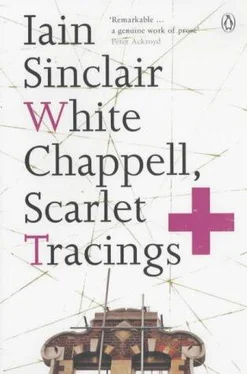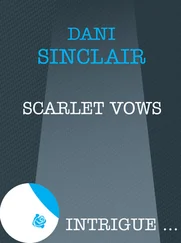I sat out in the doorway, mopping my neck with a handkerchief, taking the sun with old Dick Brandon, risking haemorrhoids upon a black stone bollard. Dick tipped, from a tin jug, his first pint of porter; drank, thin neck convulsing. He could have my jug as well: on this base our relationship was founded.
I wanted to listen and absorb, he talked. He did not need any audience, or prompting. He didn’t tell the stories, they told him. Stooped old man, veins bumping in transparent skin, the flawed smoothness of something left too long in water: voice from an uninhabited shell. Everything extraneous to the story had been eaten away, fed now only by the drink that he himself brewed. Unnoticed; his words ignored by the other workmen, busy notching up the overtime, playing the angles, polishing the hub caps of their bile-coloured Rovers, carving out those little necessary extras.
‘Used to watch fires (sniff): seen wards of the city go up like when they burn the stubble; seen clocks melt (sniff); seen horses on fire break out of them stables, down Woodseer cross Deal, up on the railway, seen ’em , manes flaming, run straight (bang) into a train. (Sniff) Seen fires starting when there wasn’t not nobody to start ’em.
‘Nights all up in that tower room, windows blinded, looking out all across the roofs; not nobody on the streets, was there? Little drink, fag, like, if I wanted, go out on the parapets, I do; go where I like, walk, Flower and Dean, Thrawl, Heneage, Chicksand, walk cross the river if I wanted, nobody else, not never touched the ground. Like a goat then, weren’t I? Didn’t ’ave no weight. Knew every bleeding stone on it and still do. Look there, that church, been all through it; like a bird, mate, nothing changed.
‘’Nother time, wasn’t it (sniff)? I hear the siren, but I never shifts. Bethnal Green Station. Thousands, mate! Pouring your river into a piss bottle. On the stairs, a woman with a kid, she fell. And more of ’em, then, wouldn’t hold back. Wall of bodies, all joined up, that’s what they said. Breath sucked all out. Pushing in from behind. A hundred and seventy bleeding three. Dead. Closed it up, bury’t ’em where they was.
‘Best morning, mate, best morning, armband, bicycle, Autumn it was, bit of mist, warm. Called out (sniff) to the Jews’ Burial Ground, weren’t I? Down Brady Street; never go before, never wanted. Great big bleeding wall up all round. Durward Street, cottages then, a bomb, they said, in the night, a whistle, two or three in the morning.
‘Made an old Jew feller let me in; wouldn’t say nothing, would he? Little door in the wall, slow with ’is key, long pockets. Not nobody goes in there till the barber’s ’ad ’is ring for ’is watchchain. Bottled walls. What’s the matter, mate? I says to him, ’fraid they’ll climb out?
‘All them graves faces one way, black, sod-ugly tongues, waiting on a sermon. Wheels the bike in, don’t I? Quiet, he’s got me at it; no birds in ’em trees, earth’s dead, mud; wouldn’t see a wasp in there. Not the same for those bastards, is it? Burnt stones, all black; was looking for the bleeding methos. Can’t see no bomb neither. All mist, mate; trousers sopping, could ’ave pissed meself.
‘And then, I don’t know, push my bike in an ’ole, not nearly. Urns all smashed, tipped on over, stones; got to report it, ain’t I? ’Ave a blow, old mate, a light, just five. Blimey, the roof! Springfield Park? I’m telling you. Protocols of Zion, what! These Jews, Fathers, sitting on the roof of this little ’ouse, they’ve got, office, what you call it? Black ’ats down on their faces, beards. Looking, pointing. Not me, mate. Starting to laugh. Blimey! Ever seen ’em laugh? Day of bleeding Judgment. Bits of ’em all over that roof. Just bits. ’Anging to it, falling off of. Laughing! Never seen nothing like it nowhere. The men that will not be blamed for nothing. No, mate!’
*
As I cultivated Dick Brandon so the sculptor, S. L. Joblard, cultivated Mr Eves of the Publicity Department. Mr Eves had a collection of photographic plates taken, by long exposure, at the sites of the Jack the Ripper murders; all the courtyards, doorways, factory gates. Some of which he would show, some of which he would not. He was rumoured to have other things also.
There were so many unrecorded rooms hidden in the secret architecture of the brewery, chambers under the roof, passageways blocked by pipes, vaults beneath the cold store, condemned stables, locked cupboards. The old ones, Brandon and Eves, went where they wanted: unreachable and free to follow their own obsessions. So that afternoon would find Dick Brandon asleep in a hammock of his own contriving, slung between two warm pipes, a nest of wild cats beneath him; would find Mr Eves, hands in white cotton gloves, carding his collection or, cyclops-eyed, viewing his photographs through an ivory-handled magnifying glass, waiting for the first trace of movement somewhere among the grey background detail; would find Joblard and Sinclair out on the streets.
The zone was gradually defined, the labyrinth penetrated. It was given limits by the victims of the Ripper: the Roebuck and Brady Street to the East, Mitre Square to the West, the Minories to the South, the North largely unvisited. Circling and doubling back, seeing the same sites from different angles, ferns breaking the stones, horses tethered on wastelots, convolvulus swallowing the walls, shadowed by tall tenements, chickens’ feet in damp cardboard boxes, entrails of radio sets, slogans on the railway bridge, decayed synagogues, the flash and flutter, cardamom seeding, of the coming bazaar culture, the first whispers of a new Messiah.
We wilfully lost the time, and ourselves: from the Nazrul, a surfeit of cockroaches, to the Seven Stars, by way of the Betting Shop. Trying the resilience of previously-unpunished digestions.
When two men meet a third is always present, a stranger to both.
It hit Dryfeld more slowly than it hit the narrator but the spikehead reacted with sharper despatch. Left his room, oilskin blinds drawn, strip-lighting dripping its sick and erratic pulse, radio jabbering World Service to a deserted floor of books, skulls, overcoats: took his bicycle from against the wall and went east.
This might be the morning when he found the second volume of Meyerstein’s Chatterton biography and rounded off the suicide collection. If all the books were netted there would be no reason to hang about: he could top himself.
The Late Watson was lying in bed and the thought of twenty thousand pounds seemed suddenly like a workable slab of time; he realised, sweating, that a piece of it could be his. The agreement stood: Nicholas Lane took the 19th century fiction, he took the 20th, Dryfeld took everything else — unless anything turned up with a selling price of more than a grand; then they split it three ways. Jamie was out, couldn’t handle the kind of arrangement that struck him as being tantamount to communism. He understood auctions. You just turned up. Didn’t bid. Agreed to keep your hands in your pocket, with his problems, no great hardship. You picked up the divy.
A slice of twenty thou was out there: it didn’t feel like his, unearned, and the chances of getting it unless he acted — NOW…
The warmth of his wife, asleep, moving against his side; he could hear Dryfeld’s voice. ‘Part-timers!’ The ultimate insult.
Dryfeld padlocked his wheels, winding a heavily-guaranteed chain in and out of the spokes, round the crossbar, over the rail that fronted a strip of wasteground to the side of the Carpenters Arms; holdall extracted from the wooden box he’d had made to carry a few of his purchases; spun on his heel, no glimpse at the masonic symbols cut into the glass of the pub door, no thought for the owners, Ron and Reg, languishing in exile, without even a decent publisher for their verses.
Читать дальше












